- Home
- Ellen Datlow
A Whisper of Blood Page 2
A Whisper of Blood Read online
Page 2
She stopped. The Person in charge was not likely to be sympathetic.
The Angel said, “I’m just trying to acquaint you with the rules.”
“I’m dead,” Rose wailed. “I shouldn’t have rules!”
“It’s not all bad,” the Angel said hastily. “You can make your astral body as young as you like, for instance. But sunlight is a problem. Living people have trouble seeing astral material in sunlight.”
For the first time in years she wished Fred were around, that con man. He could have found a way out of this for her if he’d felt like showing off.
“It’s not fair!” Rose said. “My G— Listen, what about crosses? Am I supposed to be afraid of crosses?”
“Well,” the Angel said, “in itself the cross is just a cross, but there’s the weight of the dominant culture to consider, and all its symbols. When western people see a cross, what are they most likely to think of, whether they’re personally Christians or not?”
Rose caught herself in time to avoid glancing upward at the shadow giant in the sky. Little changes of terror ran through her so that she felt herself ripple like a shower curtain in a draft. No poor scared dead person would be able to hold her astral self together under that kind of stress.
The Angel began to move away from her, pacing solemnly on the air over the street where a cab trapped by a double-parked delivery truck was honking dementedly.
“Wait, wait,” Rose cried, ransacking her memory of Dracula, which she and her sister had read to each other at night by flashlight one winter. “What about crossing water? Is it true that a vampire can’t cross water?”
“Running water can disorient you very severely,” the Angel said over its exquisite shoulder. “You could find yourself visiting places you never meant to go to instead of the ones you did.”
Water flows downhill, Rose thought. Down. Hell was down, according to Mary Hogan, anyway. She made a shaky mental note: Don’t cross running water.
“How am I supposed to remember all this?” she wailed.
The Angel rose straight into the air without any movement of the translucent wings she now saw spreading from its back. “Just think of the movies,” it said. “Film is the record of the secret knowledge of the cultural unconscious.”
“You sound like Dr. Simkin, that terrible shrink my daughter sent me to,” Rose accused the floating figure.
“I was Harry Simkin,” the Angel replied. “That’s why I’m doing your intake work.” It folded its aristocratic hands and receded rapidly toward the high, rolling clouds.
“My God, you were a young man,” Rose called after it. “Nobody told me you died.”
The door onto the roof burst open with a crash and two boys lugging heavily weighted plastic bags tumbled out, shouting. Ignoring Rose, they rushed to the parapet. Each one took a spoiled grapefruit out of one of the bags and leaned out into space, giggling and pointing, choosing a passing car roof to aim for.
Rose sidled up to the smaller one and cleared her throat. As loudly as she could she said, “Young man, how would you like to meet a real vampire?”
He lobbed a grapefruit and ducked behind the parapet, howling in triumph at the meaty sound of impact from below but apparently deaf to Rose’s voice. Revolting child. Rose bent over and tried to bite his neck. He didn’t seem to notice. But she couldn’t unwrap the scarf he wore, her fingers slipped through the fabric. So she aimed for a very small patch of exposed skin, but she had no fangs that she could discover and made no impression on his grimy neck.
The whole thing was a ludicrous failure. Worse, she couldn’t imagine how it could work, which did not augur well for her future as a vampire. Maybe the Angel had lied. Maybe it was really a devil in disguise. She had never trusted that Simkin anyway.
Worst of all, she was continually aware of the looming, ever-darkening presence, distant but palpable to her spirit, of Him Whom Papa Sol had scoffed at with good socialist scorn. It was all so unfair! Since He was up there after all, why didn’t He do something about these horrible boys instead of harassing a poor dead old woman?
Rose didn’t want Him witnessing her ineptitude, which might inspire Him to drag her up there to face Him right now. She gave up on the grape-fruit-hurling boys and drifted back down to 14C.
It gave her some satisfaction to sift under the sealed apartment door in the form of an astral mist. She floated around admiring the handsomely appointed rooms; she had always had excellent taste.
In the bathroom the tub was empty and reeked of pine-scented disinfectant. Someone had already made off with her silver-backed hairbrush, she noted. But what did that matter, given that her strides were unusually long and slightly bounding, as if she were an astronaut walking on the moon? This could only mean that she was lightening up, just as the Angel had warned.
Frantically she clawed astral material out of the air and patted it into place as best she could, praying that in the absence of blood this astral gunk itself might help to hold her down until somebody came and consented to be a—donor. Her children would come, if only to calculate the considerable value of her things. She was determined to greet them as herself, or as near to that as she could get, to cushion the shock of her request for their donations.
She couldn’t see herself in the mirror to check the likeness or to inspect her mouth for fangs. Astral material had a number of limitations, it seemed, among them inability to cast a reflection. She couldn’t even turn on the television; her astral fingers wouldn’t grip the switch. She couldn’t pick up things, the Chinese figurines and fine French clocks that she had brought back from travel and had converted into lamps. Very nice lamps, too. Fred had done his import deals or whatever had been really going on—half the time she had thought him a secret arms trader—but Rose was the one who had had the eye.
My God, she’d been a shopper!
How light she was, how near to drifting—up. No wonder vampires were so urgent about their hunger. By the time Bill the super showed up with two yuppies in tow, Rose felt that for the first time she understood what her daughter Roberta used to mean by that awful phrase “strung out.”
Bill was saying, “—first refusal on the lease, that’s the law, but if nobody in the old lady’s family wants to take it up, then—”
He saw her—the windowpanes, Rose noted, were now dark—and turned red. “I don’t know how you got in here, lady, but you’ll have to leave.”
He didn’t seem to recognize her. Of course he wasn’t expecting her. Maybe she hadn’t done such a hot job with the astral stuff?
She said firmly, “Bill, I have every right to be here, and if these are prospective new tenants you’ve sneaked in for bribe money, they ought to know that I’m staying.”
The young woman said, “Excuse me, but who is this?”
The color drained from Bill’s face. He said hoarsely, “What are you doing here, Mrs. Blum? You were dead in the tub, I found you.” He waved his arms. “You can’t stay here!”
“Let’s cut the crap, all right?” the young man said. He thrust money at Rose. Several fifties and three of his fingers went through her forearm.
“Ted, she’s a ghost,” the woman said, clutching at his coat. “She must be the ghost of the woman who died here.”
“Well,” Ted said, letting his extended hand float slowly back down to his side. “Tiffany, honey, I think you’re right. So, uh, what would you think about living in a haunted, I mean, co-occupying with, um? I’m sure we could work something out, a sort of time-share arrangement? I mean, look at the height of these ceilings.”
Rose said, “Sure, we can fix it. All I need is for you to let me drink a little blood now and then. You could take turns.”
“Ah, Jesus,” sobbed Bill.
Tiffany’s eyes bulged. “It’s not a ghost,” she gasped. “It’s a vampire.”
“How much blood, exactly?” Ted said, pale but still game.
“I don’t exactly know,” Rose said. “We’d have to experiment a little at fir
st—”
They fled.
“That’s a ten-thousand-dollar finder’s fee you cost me!” howled Bill the super, lunging at her.
His breath reached her before he did, and Rose felt her careful astral assemblage fly apart. He had been eating garlic, and the fumes acted on her new body like acid. Her consciousness bounced around like a beach ball in the slipstream of a speeding truck as her body dissolved.
Bill jammed his fist into his mouth and ran, slamming the door so hard behind him that a very nice French Empire miniature fell off the wall.
“Garlic,” said a familiar voice. “It’s a remarkable food. Completely dissolves the cohesability of astral material.”
Grabbing for errant parts of her body, Rose grumbled, “Why didn’t you tell me?”
“I tried to cover everything,” the Angel said.
“Listen, Dr. Simkin,” Rose said. “I can’t do this. I’m no vampire. I’m a nice Jewish girl.”
“A nice Jewish radical girl, not religious at all,” the Angel reminded her. “You named your first cat Emma Goldman.”
“We were all freethinkers in those days, but so what? A Jew is a Jew, and Jews don’t have vampires. I can’t do this blood-drinking thing. It’s not natural.”
The Angel sighed. “It’s your choice, of course, but you’ll have to go up. Your life review is overdue as it is.”
Rose thought of God reviewing her life. “What about you?” she said desperately. “You must be drinking blood yourself, to be sticking around driving me crazy like this. You could spare me some.”
“Oh, no,” the Angel said, “I do all my work strictly on the astral, nothing physical at all. I don’t need weight.”
“Why do you look like that?” Rose said. “Harry Simkin didn’t look like that, don’t think I don’t remember.”
“Well, I like it,” the Angel answered rather shyly. “And I thought it would reassure you. You always had a good eye for art, Mrs. Blum.”
“A lot of good it does me now,” she said. “Listen, I want to talk to Fred. You know Fred, my husband?”
The Angel cocked its head to one side and rolled its blank eyes. Then it said, “Sorry, he’s not available. He’s finished his processing and moved on to another stage.”
“What stage?” Rose said, feeling a surprising twinge of apprehension for Fred. She remembered all those New Yorker cartoons showing fat-bellied businessmen making glum quips to each other in hell, with pitchfork-toting devils leering in the background.
“Don’t you think you have enough to deal with as it is?” the Angel countered. “You’re bobbing, you know, and your head isn’t on straight. It won’t be long at this rate.”
“I’ll find somebody,” Rose said quickly. “I need more time to get used to the idea.”
“Don’t take too long,” the Angel said. “Isn’t it interesting? This is the first time you’ve asked me about anybody who’s come before you.”
“What?” said Rose. “Anybody, who? Who should I ask about? I’ve been on my own for twenty years. Who cares for an old woman, so who should I care for?”
The Angel, inspecting its fingernails again, drifted silently out through the pane of the closed window.
It was very quiet in the apartment. The walls in these old buildings were very thick, with real plaster. Rose had peace and quiet in which to reassemble herself. It wasn’t much fun—no point in making yourself look like, say, Marilyn Monroe if you couldn’t see yourself in the mirror—and it wasn’t easy, either. At one point she looked down and realized she had formed up the shape of her most recent cat, Mimsy, on a giant scale.
She was losing contact with her physical life, and nobody was likely to come around and help her reestablish it again for a while. Maybe never, if Bill the super went gibbering about what he’d seen in the apartment.
She hovered in front of the family photographs on the wall over the living-room mantel. The light was hard to see by, odd and watery—was it day or night?—but she knew who was who by memory: Papa Sol and Mama; Auntie Lil with that crazed little dog of hers, Popcorn was its name (God, she missed Mimsy, and the others); the two Kleinfeldt cousins who had gone to California and become big shots in television production; Nana in her old-fashioned bathing suit at Coney Island; Uncle Herb; more cousins. She had completely lost track of the cousins.
There was one picture of Fred, and several of the two cute babies who had turned into Mark and Roberta. I should have stuck to shopping and skipped the kids, she thought.
Two pictures showed Rose herself, once amid the cousins now scattered to their separate marriages and fates, and once with two school friends, girls whose names now escaped her. As everything seemed bent on escaping her. She sat in the big wing chair and crossed her astral arms and rocked herself, whispering, “Who cares for an old woman?”
There was no help, and no safe place. She had to hold on to the arms of her chair to keep from floating several inches off the seat. If she didn’t get some blood to drink soon, she would float up before that huge, angry face in the sky and be cast into hell on a bolt of black thunder—
The door opened cautiously and a man walked into the apartment. It was her lawyer, Willard.
“Oh, my God,” he murmured, looking straight at her. “They told me the place was haunted. Mrs. Blum, is that you?”
“Yes,” she said. “What time is it, Willard?”
“Seven-thirty,” he said, still staring. “I stayed late at the office.”
Seven-thirty on a November evening; of course he could see her. She hoped her head was on straight and that it was her own head and not Mimsy’s.
“Oh, Willard,” she said, “I’ve been having the most terrible time.” She stopped. She had never talked to anyone like that, or at least not for a very long time.
“No doubt, no doubt,” he said, steadying himself against the hall table and putting his briefcase down carefully on the floor. “Do you still keep scotch in the breakfront?”
She did, for the occasional visitor, of which scant number Willard had been one. He poured himself a drink with shaking hands and gulped it, his eyes still fixed on Rose. He poured himself another. “I think I’d better tell you,” he said in a high, creaky tone very unlike him, “this haunting business could have serious repercussions on the disposition of your estate.”
“It’s not haunting, exactly,” Rose said, gliding toward him. She told him what it was, exactly.
“Ha, ha, you’re kidding, Mrs. Blum,” Willard said, smiling wildly and turning a peculiar shade of yellow. He staggered backward against the edge of the couch, turned, and fell headlong. His glass rolled across the carpet and clinked against the baseboard. Rose saw a pale mist drift out of the top of Willard’s head as his body threshed briefly in the throes of what she immediately recognized as a heart attack like the one that had killed Fred.
“Willard, wait,” she cried, seeing that his foggy spirit stuff was rapidly escaping upward into the ceiling. “Don’t leave me!”
But he did.
Rose knelt by the body, unable to even attempt to draw its still and cooling blood. The Angel didn’t show. Willard Carnaby must have gone directly wherever he was headed. She felt abandoned and she cried, or something like it, not for Willard, who had known, as usual, where to go and how to get there with a minimum of fuss, but for herself, Rose the vampire.
After they took the body away nobody came for days. Rose didn’t dare to go out. She was afraid she would get lost in the uncertain light; she was afraid she would run into the outwash from some restaurant kitchen and be blasted to such smithereens by garlic fumes that she would never be able to get herself together again; she was afraid of water running in the gutters and crosses on churches. She was afraid of the eyes of God.
She was bumping helplessly against the bedroom ceiling in a doomed panic when someone did arrive. Not Roberta (as she at first thought because of the honey-gold hair) but Stephanie, from the next generation; her granddaughter, who wanted to be—what? A
n actress. She was certainly pretty enough, and so young. Rose blinked hungrily at her.
Someone was with her, a boy. Stephanie pulled back the curtains and daylight streamed in. She would not be able to see Rose, maybe not even hear her.
Rose noticed something new—a shimmer of color and motion around Stephanie, and another around this boy. If she concentrated hard, while floating after them as they strolled through the place giggling and chatting with their heads together, Rose could see little scenes like bits of color TV taking place within the aura of each of the young people: quick little loops of the two of them tangled in each other’s arms in his, and a rapid wheel of scenes in Stephanie’s aura involving this boy dancing with her, applauding from an excited audience, showing her off to important people.
Their hopes and dreams were visible to Rose, like sit-com scenes without sound. The walking-on-the-beach scene, a comfortable winter beach with gray skies and green sea and no sand fleas, Rose recognized at once. She had had the same fantasy about Fred.
While he was having, no doubt, fantasies like this boy’s, of sex, sex, and more sex; and sex with another girl, some friend of Stephanie’s—
“Dump him, Stephanie, he’s nothing but a wolf,” she said indignantly, out loud.
The boy was too rapt in his hormones to hear. Stephanie frowned and glanced sharply around the room.
“Come on,” the boy said. “Who’d know? It would be exciting.” Good grief, he was proposing that the two of them make love right here—on the floor, on Rose’s antique Chinese carpet! Rose saw the little scene clearly in his aura.
Stephanie hesitated. Then she tossed her honey hair and called him an idiot and tugged him out of the place by the hand. But she came back. She came back alone after dark and without turning on the lights she sat down quietly in the big wing chair by the window.
“I heard you, Gramma Rose,” she said softly, looking wide-eyed around the room. “I heard what you said to me about Jeff, and you’re right, too. I know you’re here. The stuff about the apartment being haunted is true, isn’t it? I know you’re here, and I’m not scared of you. You can come out, you can talk to me. Really. I’d like it.”

 Inferno
Inferno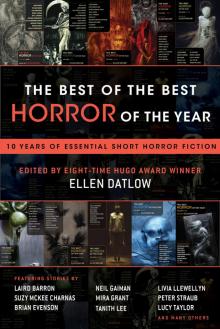 The Best of the Best Horror of the Year
The Best of the Best Horror of the Year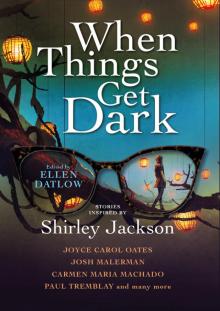 When Things Get Dark
When Things Get Dark A Whisper of Blood
A Whisper of Blood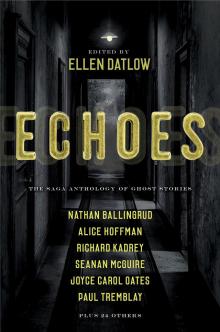 Echoes
Echoes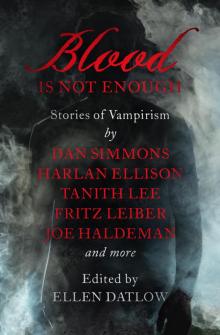 Blood Is Not Enough
Blood Is Not Enough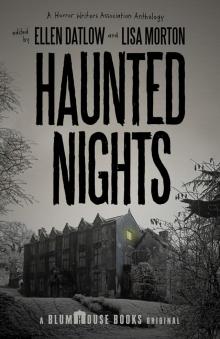 Haunted Nights
Haunted Nights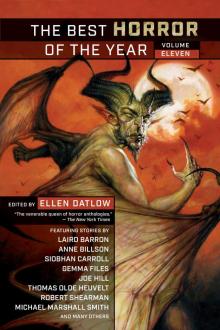 The Best Horror of the Year Volume Eleven
The Best Horror of the Year Volume Eleven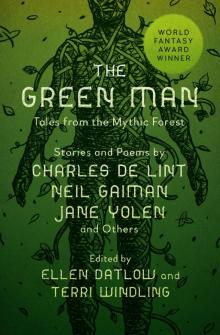 The Green Man
The Green Man The Dark
The Dark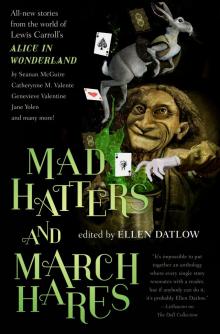 Mad Hatters and March Hares
Mad Hatters and March Hares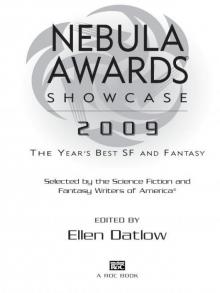 Nebula Awards Showcase 2009
Nebula Awards Showcase 2009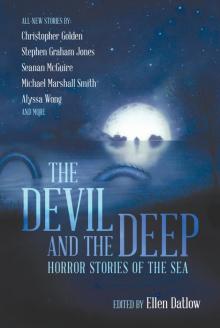 The Devil and the Deep
The Devil and the Deep